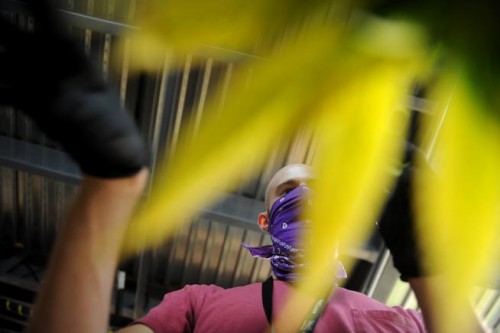Several of those students told AL.com that they and others believe they were only on the unit’s radar because Ryan “narc-ed.” They spread word that he may have turned on them, and Ryan said his reputation has never recovered.
“It was stupid. It was just, like, minor weed stuff and I felt horrible about it. They made me buy, like, small amounts of weed from people,” he said. “I had to meet them first — the police — and they would follow you and make sure you did everything right. It was just like a scene in the movies.”
Ryan explained that task force officers would wire him up to record audio and then send him into the homes and cars of fellow students, most of whom were friends and acquaintances whose names he offered up as part of his arrangement with the drug unit.
He would purchase a gram of marijuana from them and then take the pot to the police, who would confiscate it with the intention of using it and the audio recordings as evidence against the students who sold to him.
A couple months later, Ryan recognized some of the people he had exposed to police scrutiny among the names of those who were arrested in the Feb. 19, 2013 raid.
“I hated doing it. It’s not me. I wouldn’t do it again,” he said. “It’s not worth all the shit. I’d rather have to get my record cleared and pay a fine and get in trouble than do all that.”
‘The only way’
Though officials were unwilling to discuss the task force’s undercover drug informant program, the direct link between information obtained by undercover student informants and subsequent arrests is detailed repeatedly in court documents.
“On February 4th and 6th, 2013, a confidential informant working with the West Alabama Narcotics Task Force purchased marijuana from (a UA student in) Tuscaloosa, Alabama,” a complaint filed with the Circuit Court of Tuscaloosa County states. “On February (19th), 2013, agents executed a search warrant on (the student) at his residence, and seized marijuana and digital scales.”

And the task force has spoken in the past about the importance of its confidential informant program. Robertson’s predecessor at the helm of the narcotics task force, Capt. Jeff Snyder, called informants “the lifeblood of what we do” in 2004, the Tuscaloosa News reported at the time.
Robertson spoke about the unit’s confidential informant program in June, though he did not specifically address the use of college students in undercover operations.
“The only way I can reach the top is through people (the task force arrests),” Robertson said, according to the Tuscaloosa News. “And the only thing that could make this guy cooperate is the fear of losing something.”
The task force spent nearly $50,000 in funds obtained via civil asset seizure to pay confidential informants and execute controlled drug deals in pursuit of drug investigations in 2014, according to documents obtained by AL.com earlier this year.
Robertson confirmed that the drug unit pays informants during an interview with “Dateline Alabama,” the university’s online news site, earlier this month.
“A big part of our budget comes from paying them, but it’s worth it,” he said. “We have to start at street level, and what we do is we give people an opportunity to help themselves, and not only help themselves but to help the community.”
‘Target on your back’
Scott had just cracked a second tallboy can of beer when several West Alabama Narcotics Task Force officers arrived on his doorstep in Tuscaloosa in the winter of 2008-09. The fifth-year UA student had been buying an ounce of weed at a time and typically just sold it to his friends, charging them enough to cover his personal pot habit.
The officers told Scott — who spoke to AL.com on the condition of anonymity — that they knew he was a drug dealer. He says he later found out that a fellow student he had been introduced to by his brother was working as a confidential informant when he bought small amounts of marijuana from him on two occasions. The police had given the informant money to purchase the pot with, and they linked the bills to Scott. Now they were ready to arrest him for distribution.
“What they did is they sat me down on my couch and the (officer) says, ‘We’ve heard you’ve been buying pounds’ and they were positive that I was a big fish. That’s an unheard-of amount for me, so I said ‘No, I have a guy who can get me an ounce but I don’t know where to get a pound,'” Scott told AL.com earlier this month.
“They said, ‘We think you’re lying.’ They just tried to pile on. They said, ‘We have enough on you for you to go to jail for five to seven years.’ Then they said if I cooperate with them they can take it all off my record.”
Scott considered his options and eventually told the police he was not willing to snitch. He was immediately arrested and ended up facing six drug charges, including multiple counts of marijuana distribution.

He ended up avoiding a jail sentence and his record was expunged earlier this year after he finished many months of drug education courses, spent more than $10,000 in fees and successfully completed a lengthy diversion program.
But Scott continues to be plagued by the fallout from the experience, which made it nearly impossible for him to find a job. And he remains fiercely critical of the student informant system that he says nearly destroyed five years of his life.
“You’re sort of deputizing kids who are, like, 19, and putting them in a high-risk situation,” he said. “When you think about the kind of people you’d have to turn on that aren’t your friends, they’re the type of people you wouldn’t want to associate with, and then you’ve got a target on your back for the rest of your life. We’re figuring out in the real world that the arrests are much, much worse than the effects of the actual drugs.”
‘You can’t trust anybody’
The level of confidence and trust UA students have both in law enforcement agencies and in one another has been severely strained by the narcotics task force’s use of students as confidential informants, according to multiple students who spoke with AL.com for this story.
Jacob, an Alabama student who agreed to be interviewed on condition of anonymity, was arrested on multiple marijuana charges during the Feb. 19, 2013 raid based on information obtained via the use of a student informant wearing a wire. He believes the student informant program is out of control.
Many UA students live in fear that their friends will narc on them, Jacob says, and he has largely isolated himself from the school’s social scene, refusing to go to most parties or bars in order to avoid potential interactions with law enforcement.
“It still happens now with the turning. Since they got a couple people to turn, those people that they collect from those turned people, they ask them to turn. It’s just growing,” Jacob said while sitting on his front porch two blocks from the UA campus. “It’s ridiculous; you can’t trust anybody. They’re creating just this big culture of people turning on each other.”
He also believes that convincing college students to inform on one another generates unnecessary anger and resentment. He and several other students arrested in the 2013 raid were raging mad at the student they believe turned on them.
“Everyone in that holding cell wanted to slash his tires, piss in his gas tank and skin him dry. He had a lot of death threats in that room,” Jacob said.
Concerns like these are fueling an escalating national discourse over whether student informant operations are doing more harm than good.
William Dinkin, a former prosecutor and current criminal defense attorney at the Virginia law firm Stone, Cardwell & Dinkin, has experience defending college students who have been propositioned to become confidential informants. He said he believes the practice is deeply flawed and in need of sweeping reforms.
Useful weed resources
Strain reviews: Check out our marijuana reviews organized by type — sativas and sativa-dominant hybrids, ditto with indicas.
Favorite strains: 25 ranked reviews from our marijuana critics
NEW: Get podcasts of The Cannabist Show.
Subscribe to our newsletter here.
Watch The Cannabist Show.
Not only is it dangerous to deploy students in undercover operations, Dinkin says, it may sometimes be illegal.
“At some point, if you’ve got an informant working really hard and constantly calling people and trying to coerce them to do something they usually wouldn’t do, they’re getting really close to entrapment,” he said via phone. “Why are these guys out there trying to create criminals out of everyday students who are out there experimenting with marijuana or whatever it may be, and in a sense fostering a market?”
‘An arrest is an arrest’
There are burgeoning efforts at the national level and in some state legislatures to try to rein in or eliminate the controversial use of college students and other young people as confidential informants. Florida and New Jersey have passed laws restricting the practice, and U.S. Rep. Steve Cohen, a Tennessee Democrat, said earlier this month that he is working on federal legislation to enact similar reforms nationwide.
But observers and experts like Lance Block, a Florida lawyer who has represented the families of five confidential informants who were killed — including three who were college students at the time of their deaths — and who has emerged as perhaps the nation’s leading critic of confidential informant operations, say that more needs to be done.
Block believes the problems with informant programs stem largely from the direct link between the number of arrests law enforcement agencies make and the level of government funding and grants they receive.
“There’s no distinction between arresting a drug lord or arresting a college student who has a couple of joints. An arrest is an arrest and there’s no question that it’s important for law enforcement, in order to maintain funding or increase the level of funding for drug enforcement,” Block told AL.com.
“The key thing is statistics drive funding, and the more arrests, the more need for funding – or at least that’s the myth. And police can increase the number of arrests even though they’re small-time drug offenders. That’s the driving force behind using confidential informants.”
Aldworth agrees that law enforcement funding is a key driver of the use of students as informants. But she says that there needs to be greater public awareness of the reach and negative impacts of the practice, no matter why it is being employed.
“I think that parents in particular would be shocked to learn that their children and their children’s friends are exposed to this kind of system while they’re in college, in particular,” she said.
“If people understood the massive scale of this system, they would be advocating strongly for controls on law enforcement, but because students are told ‘don’t talk to anyone,’ people just don’t know how big this system really is.”
